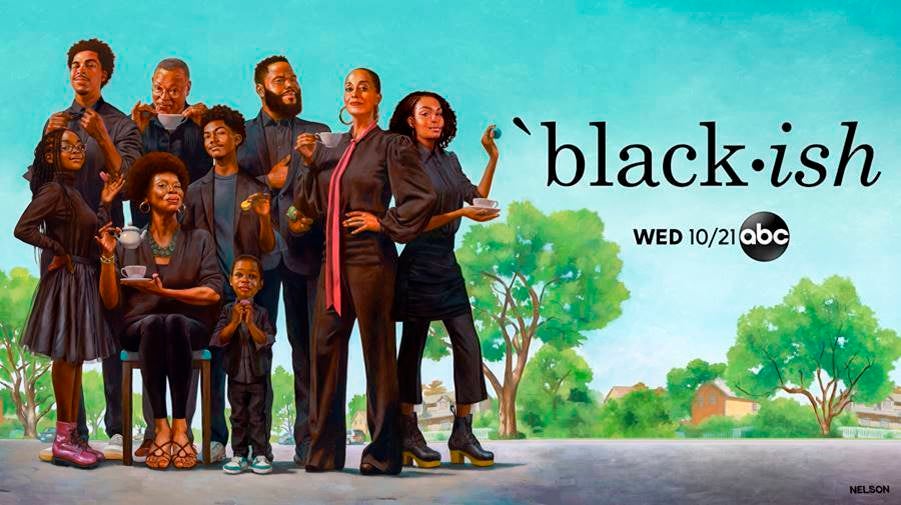Johnsons are 'sipping tea' for 'black-ish' family portrait
When ABC decided the Johnsons of “black-ish” were due a portrait, it sought an artist who understands the family's perspective

Your support helps us to tell the story
From reproductive rights to climate change to Big Tech, The Independent is on the ground when the story is developing. Whether it's investigating the financials of Elon Musk's pro-Trump PAC or producing our latest documentary, 'The A Word', which shines a light on the American women fighting for reproductive rights, we know how important it is to parse out the facts from the messaging.
At such a critical moment in US history, we need reporters on the ground. Your donation allows us to keep sending journalists to speak to both sides of the story.
The Independent is trusted by Americans across the entire political spectrum. And unlike many other quality news outlets, we choose not to lock Americans out of our reporting and analysis with paywalls. We believe quality journalism should be available to everyone, paid for by those who can afford it.
Your support makes all the difference.When ABC decided the Johnsons of “black-ish” were due a portrait, it sought an artist who understood the family's perspective.
The task went to painter and illustrator Kadir Nelson, a chronicler of contemporary African American experience and an admirer of the sitcom The result is a captivatingly sly, 70x70-inch oil-on-canvas work that depicts series stars including Anthony Anderson and Tracee Ellis Ross in character and part of a riff on the “sipping tea” meme.
Nelson said the approach fits a tumultuous time of political conflict and racial reckoning.
“I was thinking about how the fictional Johnson family would respond,” he said, when he hit on the meme. “You’re kind of sitting back and observing with this knowing look: ‘I know what’s going on. I may say something sassy, but I’m just going to be over here minding my business, sipping my tea.' And that’s what the Johnson family is doing.”
Created by Kenya Barris, “black-ish” returns Oct. 21, with Laurence Fishburne, Jenifer Lewis and Deon Cole among the cast members.
The prolific Nelson, an award-winning book illustrator and author, has paintings in institutions including the Smithsonian and the National Museum of African American History and Culture. Among his New Yorker magazine cover images is a powerful tribute to George Floyd and other Black victims of violence.
Art is essential to help navigate such a “rollercoaster” period, he said.
“It's a way of documenting our times, expressing our fears, our angst, our dreams, our thoughts and emotions. And it gives us a way to look forward,” he said, citing visual images delivered through smartphones, computers and TV as especially influential.
"There are very important or visceral images that grab our attention and provoke thought and may inspire us to take action or do something that brings forth the best part of ourselves, hopefully.”
With his painting for “black-ish,” Nelson sees himself following the path of the late artist Ernie Barnes, whom he described as a mentor. “The Sugar Shack,” Barnes' joyous painting of a music club, was used in the 1970s sitcom “Good Times” and as cover art for Marvin Gaye's 1976 album “I Want You.” Nelson's art has appeared on album covers including Drake's “Nothing Was the Same.”
Nelson's painting will be the basis for “black-ish” print, digital and other promotion in its seventh season, based on a high-resolution image of the work that he has retained. The artist anticipates that the original will end up with a collector.
In 2017, he created another work for “black-ish,” this one used in the “Please, Baby, Please” episode that was a lament on social and environmental ills and took sharp jabs at at President Donald Trump. Shelved by ABC, it saw the light of day when Disney corporate sibling Hulu released it earlier this year.
ABC said Nelson was “the first artist on the list” for the family portrait, citing his contribution to “Please, Baby, Please” and his recent works for The New Yorker and Rolling Stone. The latter used Nelson's “American Uprising,” depicting a woman and child at the forefront of a protest march, to illustrate a Black Lives Matter cover story.
In developing the concept for the “black-ish” painting, the network and the show's producers gave him “pretty much free reign,” Nelson said, and a sketch sold them on the idea of the Johnsons coping together despite the pandemic quarantine.
Like “The Cosby Show” before it, Nelson said, “black-ish” depicts a successful family with humor and warmth, headed by professionals (dad is an advertising executive, mom a medical doctor) who are attentive parents.
While the Johnsons face issues common to all Americans, providing a Black family's perspective allows the series to hit “very key points that we all need to think about,” he said.
”And we have to talk about them to provoke conversations, to inspire conversations and and inspire action," Nelson said.
___
Lynn Elber can be reached at lelber@ap.org and on Twitter at http://twitter.com/lynnelber.